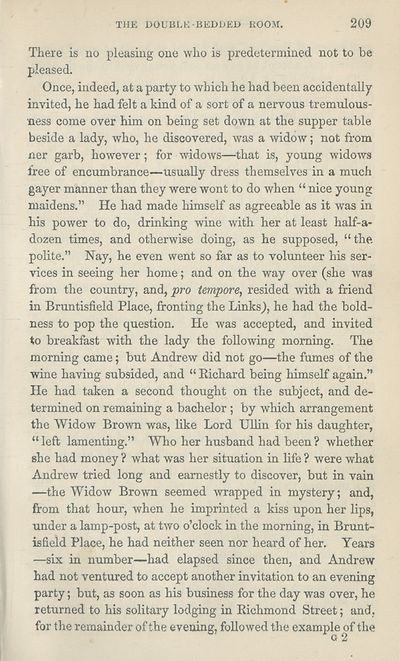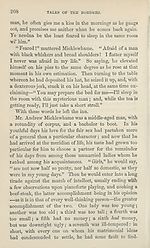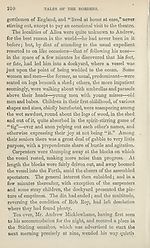Download files
Complete book:
Individual page:
Thumbnail gallery: Grid view | List view

THE DOUBLE-BEDDED BOOM.
209
There is no pleasing one who is predetermined not to be
pleased.
Once, indeed, at a party to which he had been accidentally
invited, he had felt a kind of a sort of a nervous tremulous¬
ness come over him on being set down at the supper table
beside a lady, who, he discovered, was a widow; not from
ner garb, however; for widows—that is, young widows
free of encumbrance—usually dress themselves in a much
gayer manner than they were wont to do when “ nice young
maidens.” He had made himself as agreeable as it was in
his power to do, drinking wine with her at least half-a-
dozen times, and otherwise doing, as he supposed, “the.
polite.” Nay, he even went so far as to volunteer his ser¬
vices in seeing her home; and on the way over (she was
from the country, and, pro tempore, resided with a friend
in Bruntisfield Place, fronting the Links), he had the bold¬
ness to pop the question. He was accepted, and invited
to breakfast with the lady the following morning. The
morning came; but Andrew did not go—the fumes of the
wine having subsided, and “ Eichard being himself again.”
He had taken a second thought on the subject, and de¬
termined on remaining a bachelor ; by which arrangement
the Widow Brown was, like Lord Ullin for his daughter,
“left lamenting.” Who her husband had been? whether
she had money ? what was her situation in life ? were what
Andrew tried long and earnestly to discover, but in vain
—the Widow Brown seemed wrapped in mystery; and,
from that hour, when he imprinted a kiss upon her lips,
under a lamp-post, at two o’clock in the morning, in Brunt¬
isfield Place, he had neither seen nor heard of her. Years
—six in number—had elapsed since then, and Andrew
had not ventured to accept another invitation to an evening
party; but, as soon as his business for the day was over, he
returned to his solitary lodging in Richmond Street; and.
for the remainder of the evening, followed the example of the
209
There is no pleasing one who is predetermined not to be
pleased.
Once, indeed, at a party to which he had been accidentally
invited, he had felt a kind of a sort of a nervous tremulous¬
ness come over him on being set down at the supper table
beside a lady, who, he discovered, was a widow; not from
ner garb, however; for widows—that is, young widows
free of encumbrance—usually dress themselves in a much
gayer manner than they were wont to do when “ nice young
maidens.” He had made himself as agreeable as it was in
his power to do, drinking wine with her at least half-a-
dozen times, and otherwise doing, as he supposed, “the.
polite.” Nay, he even went so far as to volunteer his ser¬
vices in seeing her home; and on the way over (she was
from the country, and, pro tempore, resided with a friend
in Bruntisfield Place, fronting the Links), he had the bold¬
ness to pop the question. He was accepted, and invited
to breakfast with the lady the following morning. The
morning came; but Andrew did not go—the fumes of the
wine having subsided, and “ Eichard being himself again.”
He had taken a second thought on the subject, and de¬
termined on remaining a bachelor ; by which arrangement
the Widow Brown was, like Lord Ullin for his daughter,
“left lamenting.” Who her husband had been? whether
she had money ? what was her situation in life ? were what
Andrew tried long and earnestly to discover, but in vain
—the Widow Brown seemed wrapped in mystery; and,
from that hour, when he imprinted a kiss upon her lips,
under a lamp-post, at two o’clock in the morning, in Brunt¬
isfield Place, he had neither seen nor heard of her. Years
—six in number—had elapsed since then, and Andrew
had not ventured to accept another invitation to an evening
party; but, as soon as his business for the day was over, he
returned to his solitary lodging in Richmond Street; and.
for the remainder of the evening, followed the example of the
Set display mode to:
![]() Universal Viewer |
Universal Viewer | ![]() Mirador |
Large image | Transcription
Mirador |
Large image | Transcription
| Antiquarian books of Scotland > Scotland/Scots > Wilson's tales of the Borders and of Scotland > Volume 3 > (221) |
|---|
| Permanent URL | https://digital.nls.uk/109231615 |
|---|
| Description | Thousands of printed books from the Antiquarian Books of Scotland collection which dates from 1641 to the 1980s. The collection consists of 14,800 books which were published in Scotland or have a Scottish connection, e.g. through the author, printer or owner. Subjects covered include sport, education, diseases, adventure, occupations, Jacobites, politics and religion. Among the 29 languages represented are English, Gaelic, Italian, French, Russian and Swedish. |
|---|

